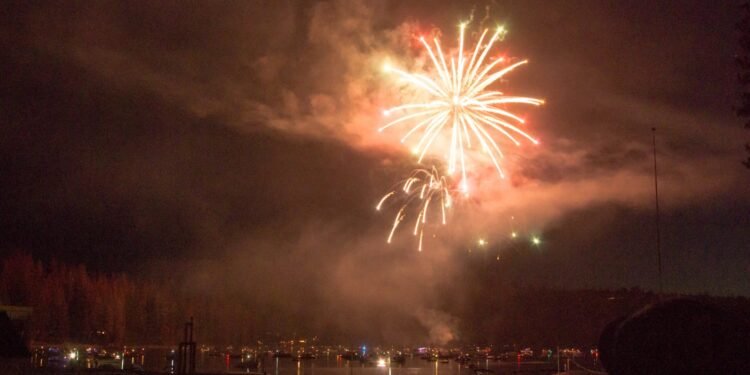This story was originally published by Inside Climate News is reproduced here as part of the Climate Desk collaboration.
Tonight, fireworks will blast skyward in states across the U.S., painting the night with vibrant blue, red and gold sparks to celebrate Independence Day.
Part of what makes these dazzling displays beautiful is also what makes them dangerous: Just one errant spark can ignite an inferno if it has enough kindling. Each year, fireworks trigger tens of thousands of accidental fires across the country, and unsurprisingly, the majority of them happen on July 4.
A growing body of research shows that climate change could make this American pastime even more risky. This year, unpredictable rain patterns and an ongoing summer heat wave have turned shrubs and grasslands across the West into a tinderbox for Fourth of July fires, experts say.
As fire departments and government officials stress safety measures surrounding celebratory pyrotechnics, others are pushing to phase fireworks out altogether — and replace them with a different luminescent display.
Firework Fiasco: Last year, researchers parsed through wildfire data stretching from 2000 to 2019 and noticed a peculiar spike on one day in particular. Nearly twice as many wildfires were recorded on July 4 as almost any other day in the U.S. West.
“Humans are the main starters of fires, and Fourth of July [is] the key wildfire ignition date,” the study’s lead author, Mojtaba Sadegh, told me.
“Humans are the main starters of fires, and Fourth of July [is] the key wildfire ignition date.”
On average, more than 18,500 fires ignite during Independence Day celebrations from fireworks mishaps or campfires, the Guardian reports. Accidental fires have always been a risk from fireworks—I mean, fire is literally in the name. But what’s changing are the conditions around these shows, said Sadegh, a civil engineer who studies fire behavior at Boise State University. As climate change accelerates, droughts and heat waves worsen, making vegetation incredibly dry.

This year, the weather conditions in the West have created the ideal environment for fire to spread, as long as something—such as lightning, a bonfire or fireworks—ignites it.
Copious amounts of rainfall from winter storms and the unprecedented atmospheric river that tore through California in February have made for a “good water year, which increased the amount of vegetation” such as grass and shrubs, Sadegh said. But this summer flipped the script when a simmering heat wave baked the West in June, drying out the brush and making these plants “ripe for that source of ignition to start the fire,” he explained.
Parts of California have already seen a busy start to fire season, including the North Bay area around Sonoma, where over 20,000 acres have burned, according to the California Department of Forestry and Fire Protection. Now, forecasts show a heat wave headed back toward the state just in time for the Fourth. Not only could this pose increased risk for fire, but the heat could also have negative health effects on people celebrating, health officials warn.
Smokey the Bear says no to sparks: To prevent accidental blazes, the federal government prohibits the possession or use of fireworks on public lands managed by the U.S. Forest Service, Bureau of Land Management and National Park Service. Violators of this rule are subject to a $5,000 fine and/or up to six months in jail.
Outside these areas, though, many fireworks shows are legally organized by cities or counties. In the West, some of these shows are located close to forests or other dry vegetation, which means that one rogue spark could spread well beyond the designated area.
While accidents do happen at these events, the majority of firework-ignited infernos are caused by individuals who attempt to light them on their own. For example, on Monday, the sheriff’s office in Idaho’s Ada County announced that a firework was the cause of a blaze that burned through 100 acres of grassland in June, local news station KTVB7 reports.
Wildfires aren’t the only risk associated with these pyrotechnic displays: Last year, the U.S. Consumer Product and Safety Commission reported 9,700 ER visits and eight deaths from fireworks, many due to user error. Additionally, a wide body of research shows that fireworks temporarily worsen air quality, which can exacerbate lung diseases or asthma. Even animals are at risk, according to a recent study that showed fireworks can stress out wildlife or affect breeding.
In recent years, some counties and cities have turned to a flying technology to brighten their skies on the Fourth of July: drones. In these shows, hundreds of drones will buzz around the open air to create large-scale shimmering images such as a rippling American flag or bald eagle. Last year, a gargantuan drone replica of the Statue of Liberty hovered over the New Jersey Waterfront outside of New York City, offering a free show for western Manhattan (though fireworks followed shortly after). This year, cities across California, Colorado and Oregon will host their own drone displays in lieu of fireworks.
While these whirring contraptions have very little fire risk, drones do have their downsides, from causing light pollution or colliding with birds. Some counties that have given drones a try in the past are now pivoting back to fireworks for various reasons, NBC News reports.
“[The drones] left us wanting, I would say,” Jeremy Rietmann, the town manager of Gypsum, Colorado, told NBC. “It didn’t feel like America.”
However, forecasts show that Gypsum is a high-risk area for wildfire, similar to many other towns across the West. As climate change continues to stoke the flames, Sadegh says fireworks are only going to become riskier in these places.
“The problem of fire ignitions at Fourth of July is going to get worse,” he said, adding that individuals should clear out dry shrubs and grasses around their houses if fireworks are planned in their area. “The climate is changing, and we’ll have a lot more dry vegetation for those fire starts.”









